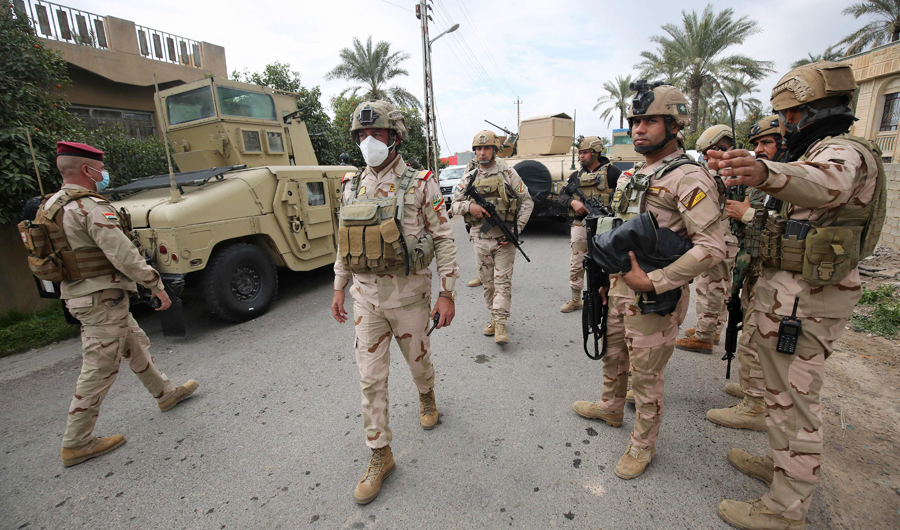CHICAGO: A week after five Americans were injured and a foreign contractor working for the US was killed during a rocket attack on a military base near Erbil International Airport in northern Iraq, Washington has yet to decide how to respond to the escalation of violence.
In the meantime there have been two additional attacks on US-linked targets in country: at least four missiles hit Balad Air Base, north of Baghdad on Feb. 20, leaving one person wounded, and on Monday two rockets landed in the Green Zone near the US embassy in Baghdad. There were no reports of casualties in the latest attack.
It is widely suspected that Iran is behind the attacks but the Biden administration has so far been hesitant to assign blame, stating after the Feb. 15 attack in Erbil that it is “assessing” who is responsible and will respond “at a time and place of our choosing.” Secretary of State Antony Blinken said on Monday that President Joe Biden has not given up on pressuring Iran on the issue of nuclear weapons, as he addressed Iran’s disruptive activity in the region.
“Iran has been not standing down but acting up in the region with various destabilizing actions, attacks on our own forces in Iraq and elsewhere, (and) on our partners,” Blinken said when he was asked whether the US had surrendered its leverage on Tehran by agreeing to enter into negotiations for a return to 2015 Joint Comprehensive Plan of Action (JCPOA), also known as the Iran nuclear deal. President Donald Trump withdrew the US from the agreement in 2018.
“So the problem has gotten worse, not better. And President Biden believes strongly that strong, principled diplomacy is the best way to try to deal with these issues, to put the nuclear problem back in the box and to push back on Iran in other areas.” Earlier White House Press Secretary Jen Psaki reiterated that the priority with Iran remains preventing the regime obtaining a nuclear weapon.
“We don’t anticipate taking additional steps, as in snapback — snapping back of sanctions in advance of that,” she said. “This is about having a conversation about the path forward. “And, yes, part of that, as we look ahead, would be a desire to have a conversation about their role in the region, their use of ballistic missiles, and that certainly is the administration’s objective.”
Last week Blinken joined French Foreign Minister Jean-Yves Le Drian, German Foreign Minister Heiko Maas, Italian Foreign Minister Luigi Di Maio, and UK Foreign Secretary Dominic Raab in issuing a joint warning about the attacks.
“We the foreign ministers of France, Germany, Italy, the United Kingdom, and the United States of America condemn in the strongest terms the Feb. 15 rocket attack in the Iraqi Kurdistan region,” they said.
“We offer our condolences to the victims, their families and the Iraqi people. Together, our governments will support the Government of Iraq’s investigation into the attack with a view to holding accountable those responsible. We are united in our view that attacks on US and coalition personnel and facilities will not be tolerated.”
No one has claimed responsibility for the recent attacks and the militants have been identified only as “Iraqi armed groups.”
However many analysts, and Iranian dissident groups, believe the blame lies squarely with Tehran.
“There is no question that the Iranian regime is behind the recent spate of rocket attacks on the US military bases and the Baghdad embassy,” said Ali Safavi, an official with the Foreign Affairs Committee of the Paris-based National Council of Resistance of Iran. “It has coined phony names for its terrorist proxy groups in fear of a harsh response. “These attacks are an attempt by Tehran to raise the stakes in the nuclear negotiations, as the ball is in its court because both the Europeans and the US have predicated any new talks on the Iran nuclear deal on the regime halting its violations and strictly abiding by the terms of the JCPOA.
“The international community should not blink and should adopt a firm approach because the ruling clerics understand only the language of decisiveness and power. Any concessions will be construed as weakness and will only embolden the regime.”
Tensions in Iraq heightened in January last year when Trump ordered the assassination of Qassem Soleimani, commander of the Islamic Revolutionary Guard Corps’ Quds Force, who was considered the second-most powerful person Iran after Supreme Leader Ali Khamenei.
Iranian officials vowed to extract “severe revenge.” The situation in northern Iraq is further complicated by the uneasy relationship between the US and Turkish President Recep Tayyip Erdogan, who has criticized Washington for protecting Kurdish forces. Erbil is the capital of Iraq’s Kurdistan Region. Shortly before the Feb. 15 missile strikes there, Kurdish militants executed 13 Turkish hostages, including soldiers and police officers. Ankara argues that the build-up of Kurdish forces in northern Iraq represents a threat to Turkish security.
Blinken previously said he called Iraqi Prime Minister Mustafa Al-Khadimi on Feb. 16 to reassure him that Washington remains committed to the safety of Iraq, and to express his “outrage” at the attack on Erbil. He also spoke with Masrour Barzani, prime minister of the Kurdistan Regional Government. He added that he had encouraged Al-Kadhimi to continue to work closely with the regional government to address violent extremism.

US outraged by recent rocket attacks in Iraq but will not lash outRockets target US embassy in Iraqi capital Baghdad

